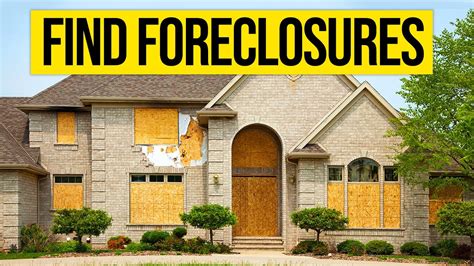How To Find Foreclosed Homes: A Step-by-Step Guide
Finding a foreclosed home, also known as a bank-owned property or REO (Real Estate Owned) property, can be a lucrative opportunity for savvy buyers. These properties often sell below market value, presenting a chance to snag a great deal. However, navigating the process requires knowledge and strategy. This guide will walk you through the steps to effectively find and purchase a foreclosed home.
Understanding the Foreclosure Process
Before diving into the search, it's crucial to understand the foreclosure process. This generally involves a homeowner failing to make mortgage payments, leading to the lender initiating legal proceedings to reclaim the property. The timeline can vary, but the outcome is usually an auction or listing of the property for sale.
Types of Foreclosures
There are several types of foreclosures, each with its own process:
- Judicial Foreclosure: This involves a court-supervised process, typically longer and more complex.
- Non-Judicial Foreclosure: This process bypasses the court system and is generally faster. The specific rules vary by state.
- Power of Sale: This clause in many mortgages allows the lender to sell the property without court intervention.
Understanding the type of foreclosure relevant to your area is essential.
Where to Find Foreclosed Homes
Now, let's explore the best places to look for foreclosed properties:
1. Multiple Listing Services (MLS):
While not exclusively for foreclosures, many real estate agents list bank-owned properties on the MLS. Working with a real estate agent familiar with foreclosures can be highly beneficial. They can provide insights into pricing and the overall condition of the property, saving you time and potential headaches.
2. County Tax Assessor Websites:
County tax assessor websites often have databases showing properties with delinquent taxes. These properties are often prime candidates for foreclosure. This is a valuable resource for independent research. However, remember that a tax delinquency doesn't automatically mean a foreclosure is imminent.
3. Auction Websites:
Several websites specialize in listing properties heading to auction. These sites often provide details about the auction date, location, and property information. It's crucial to understand the auction process and rules before participating.
4. Bank Websites:
Lenders sometimes list their REO properties directly on their websites. Check the websites of major banks and mortgage lenders in your area.
5. RealtyTrac and Other Foreclosure Listing Sites:
Websites like RealtyTrac (while not directly providing download links) aggregate foreclosure listings from various sources. These are convenient tools for researching properties in your area. Always verify the information found on these sites through other channels.
Tips for Successful Foreclosure Home Hunting
- Be prepared to act quickly: Foreclosures often sell fast.
- Get pre-approved for a mortgage: This shows sellers you're a serious buyer.
- Conduct thorough inspections: Foreclosed homes may require significant repairs. A professional inspection is vital.
- Be aware of potential hidden costs: Factor in closing costs, repairs, and potential legal fees.
- Negotiate aggressively (but respectfully): Banks may be motivated to sell quickly.
Beyond the Search: Due Diligence is Key
Finding a foreclosed home is only half the battle. Thorough due diligence is critical to avoid costly mistakes. This includes:
- Title search: Verify ownership and any liens on the property.
- Property inspection: Identify any necessary repairs or structural issues.
- Neighborhood research: Assess the desirability and safety of the area.
Finding a foreclosed home can be rewarding, but it requires careful planning and diligent research. By following these steps and utilizing the resources available, you'll significantly increase your chances of securing a great deal on your next property. Remember to always consult with professionals, such as real estate agents and lawyers, throughout the process.
